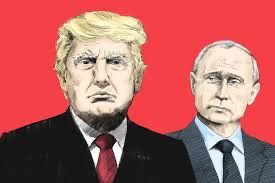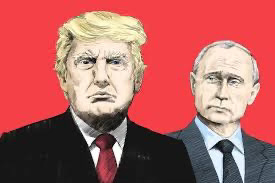The World Trump Wants: How America’s Retreat Reshapes Global Power
In the corridors of global power, history is not written—it is rewritten.
With each passing day, the intricate dance between Donald Trump, Vladimir Putin, and Ukraine’s defiant leader, Volodymyr Zelensky, edges closer to a dangerous climax. The stakes have never been higher, and yet, instead of standing firm, the United States teeters on the brink of retreat.
Trump’s overtures to the Kremlin are no longer speculation—they are policy in the making. The announcement of an upcoming summit with Putin, as confirmed by Russian Deputy Foreign Minister Sergei Ryabkov, is framed as an opportunity to address global issues. But conspicuously absent from the table is Ukraine, the very nation whose sovereignty is at stake. This is not diplomacy; it is the deliberate marginalisation of a country fighting for its survival.Worse still, Trump has now gone beyond diplomatic ambivalence and into outright revisionism. His assertion that Zelensky is responsible for the war in Ukraine is not just a reckless misstatement—it is a calculated betrayal. By shifting blame onto Ukraine, he absolves Putin of his brazen act of aggression and breathes life into the very disinformation the Kremlin has weaponised since 2014. This is no isolated remark. It is part of a wider, insidious effort to rewrite history:
- It erases Russia’s illegal annexation of Crimea.
- It ignores eight years of bloodshed in Donbas at the hands of Russian-backed separatists.
- It brushes aside the atrocities of Bucha, Mariupol, and Bakhmut—where Russian forces left nothing but devastation.
And what is the consequence? If Ukraine is recast as the aggressor, then why should NATO, the European Union, or the United States continue supporting it? Why should weapons, financial aid, and intelligence flow to Kyiv if its leader is painted as the villain? This is not just rhetorical gymnastics—it is the groundwork for an American withdrawal.
A Message to Allies: The United States is No Longer Guaranteed
This moment is about more than Ukraine. It is a warning to every nation that once relied on American leadership: the United States may no longer be the ally you thought it was. Trump’s rhetoric signals a profound shift—one that will reverberate across Europe and beyond. If America disengages, the old assumptions that have defined global stability for nearly eight decades—sovereignty, territorial integrity, and collective security—will crumble. This is not just about policy; it is about the future of the post-World War II order.
For Europe, the question is no longer whether America will retreat, but when.
President Zelensky has already drawn the only logical conclusion: Europe must prepare to stand alone. His calls for a European army—once dismissed as impractical—now carry newfound urgency. Without American military might as a backstop, Europe must forge its own path to defence. The alternative is helplessness, waiting to see which nation is next to face an authoritarian land grab. History teaches a brutal lesson: the unprepared are punished. Europe now stands at a crossroads.
The Hypocrisy of Trump’s Words
Perhaps the most galling part of this entire geopolitical shift is Trump’s hypocrisy. A man who tried to overturn an election calls Zelensky a dictator. A man who incited an insurrection warns about threats to democracy. A man who sought to purge the military of disloyal officers dares to issue lectures on tyranny. Trump’s accusations against Zelensky are not just absurd—they are projection in its purest form. He is not sounding an alarm against authoritarianism; he is laying the groundwork for his own. Seventy million Americans voted for a vision of withdrawal. The question is, do they understand what that truly means?
For decades, the United States has not just been a superpower—it has been the world’s stabiliser. American leadership has deterred aggression, upheld alliances, and prevented conflicts from spiralling into global catastrophes. That power is now fading—not by force, but by choice. Some will argue that this is merely a correction, a return to pragmatism where America focuses on its own affairs. Others will say it is a reckless abdication of responsibility, a betrayal of the alliances that have kept the world from plunging into chaos. Both perspectives deserve consideration. But history does not favour the isolationists. Great powers that retreat from the world stage do not avoid crisis—they invite it. America may turn its back on global leadership, but the world will not wait for its return. Instead, new forces will rise to fill the vacuum—forces that do not share America’s values, its commitment to democracy, or its vision of stability.
The world is watching. The choice America makes now will not just define the next election—it will shape the course of history.
What Comes Next?
If the United States is no longer willing to uphold the international order it helped build, then Europe must forge its own. That means:
- Strengthening European defence and military-industrial capacity.
- Reducing reliance on American security guarantees.
- Ensuring the continent is not paralysed by political infighting when unity is needed most.
To act now is not to reject the United States. It is to accept reality. The era of European dependency is over. The illusion that past alliances alone will ensure security must be abandoned.
As Winston Churchill once warned: "Want of foresight, unwillingness to act when action would be simple and effective, lack of clear thinking, confusion of counsel... until self-preservation strikes its jarring gong—these are the features which constitute the endless repetition of history." Europe cannot afford to hesitate. The time for decisive action is now.
And to America: What Will You Choose?
For the American people, the question is simple: Is this the moment when you reclaim your sovereignty, or is it the moment you surrender your influence?
Will the United States still be the nation others look to in times of peril, or will it be the nation others move past, uncertain of its resolve? Most crucially, if the world one day finds itself in crisis and America stands alone, will it be by choice—or by the consequences of its own retreat?
What say you?
---
References
- A game of tact to win round the wrecking-ball president. (2025, February 23). The Times.
- Trump-Putin summit preparations are underway, Russia says. (2025, February 23). AP News.
- Zelensky 'refuses to sign Trump deal' on Ukraine war after White House insiders rage he'd be 'six feet under' without US. (2025, February 23). The Sun.
- What Could Happen if the U.S. Abandons Europe. (2025, February 22). The New Yorker.
- Italy's Meloni defends Vance's Munich speech chastising Europe. (2025, February 22). Politico.
- In Munich, Vance accuses European politicians of censoring free speech. (2025, February 14). Reuters.
- Zelensky should 'get together' with Putin to strike peace deal, says Trump. (2025, February 23). The Times.
- Vance rightly excoriates Europe: What values are we defending? (2025, February 17). New York Post.
- Has JD Vance's Munich speech signalled a new European order? (2025, February 17). The Times.
- Putin is BLUFFING & is ready to launch huge new attack, Ukraine warns after Vlad praises Trump over peace talks. (2025, February 23). The Sun.
- Ukraine's Zelensky accuses Trump of living in Russian 'disinformation space'. (2025, February 23). The Guardian.





